About 20 years ago, Vladimir Radojevic set foot into the world of fashion. His first stint was as a sales assistant in a multi-brand store in Serbia, where he grew up. A larger part of his career would shape up after he took a decision to join Dubai-based Al Boom Marine, a sports lifestyle company.
“I knew Dubai was one of the retail capitals of the world. There was a lot more opportunity to grow. It felt like the right next step,” Vladimir recalls in a conversation with YourStory Gulf Edition.
Around 2019, he decided to take an MBA in hopes to climb the corporate ladder and secure a stable income. In due course of his time at ISC Barcelona, he became well-travelled, having visited a number of different places like New York, Shanghai, and Ghana. What struck during his travels especially in New York was Stitch Fix. By this time Vladimir was the Head of Sales at Al Boom Marine.
“It wasn’t traditional retail or ecommerce, it is in touch with the future,” said Vladimir. The company used artificial intelligence to personalise outfits for users, which was unlike the ecommerce shopping trends of our times. “They offer a lot more to a customer than traditionally commerce will just go and click and buy,” he adds.
He soon began to delve deeper into the idea. Vladimir began conversations with industry professionals in Argentina and set out to make a business plan, slowly stringing together answers to questions about capital, market numbers—all while figuring out the essentials of building a business. Then came the pandemic.
“I was two weeks away from resigning. Thankfully, I didn’t,” says Vladimir. “It wasn’t the right time for me, so I put everything on hold. But when things started to progress and, in the UAE, the situation was under control quickly. It was then that I decided to go for it. I set up Dresos in late 2020 and in early 2021.”
Now, Vladimir runs Dresos a fashiontech platform helping customers curate outfits that is in tandem with their own preferences and choices, along with his long-time friend Aleksander Jankovic.
Dresos falls into the wider fashion market. Fashion sales in the GCC markets is over $50 billion, according to a report by McKinsey. Spending in this region is among the highest on a per capita basis globally reaching just over $500 and $1600 per person in Saudi Arabia and UAE, it said.
At the moment, Dresos has about 4000 registered users and 500 active customers.

The Dresos Team
Building on what exists
Just like Stitch Fix, and startups like MrDraper and Wear That, the user on Dresos is asked to fill out a quiz which informs the company about their preferences.
Soon after this is done, a stylist gets in touch with the user for a quick consultation and delivers a box. The styling and delivery is free. Dresos claims to have an average basket size value of approximately $408 (AED 1500.)
“We focused on both genders, and on style and convenience unlike the others. Also, the option to try before buying was appealing. The customer has no risk perse,” says Vladimir.
Now the team has set its sights on launching a new function where customers can get personalised outfits immediately. This will be done with artificial intelligence. Dresos launched the beta version at Gitex 2022. Even with the AI angle, it isn’t look to completely discontinuing the stylist services.
“This is where we see scalability where we think a stylist and personal approach is important. But not always,” says Vladimir.
Then comes inventory. One of the chief concerns in the area of fashion is managing inventory. Dresos quickly realised that managing inventory would become an operationally intensive task. Instead, it opted to go for a consignment structure—where it has access to numerous brands without holding its stock.
Vladimir’s experience came to bring about the consignment model. Retailers were impressed with the idea of styling and the experience of the team. They also were convinced once they set their eyes on Dresos’ packaging, the message and its elevated experience. Today it works with brands like Levi’s, Oakley, Cole Haan, Galeries Lafayette, New Era, Tommy Bahama, and Skechers and refrains from working with fast fashion brands.
New products on the horizon
Besides artificial intelligence (AI), Dresos has a working product of a 3D body scanner—where people can scan themselves and get a high-quality avatar with 3D clothes. “We got a lot of feedback that people want to see how they look, and the machine can get highly accurate measurements,” says Vladimir.
Dresos’s tech team, consisting of 7 members based in Poland and Ukraine, is also building a software solution that will be made available to online retailers, where people can scan from the comfort of their homes.
It is looking to bring its 3D body scanners, especially in malls where customers can see their own avatars with the exclusive collection. Dresos is part of In5,—a platform that startups can use to accelerate their ideas to the market. It will launch its 3D scanners here.
Dresos is also in talks of closing a pre-seed funding round.
Meanwhile, it is also not shying away about the possibility of using the metaverse. “The GCC is actually a favourable environment for NFTs. A lot of luxury consumers expect their brands to be on the Metaverse, and the region also has all these customers having cryptocurrencies,” says Vladimir.
“We also see the Metaverse as a big opportunity… we want to be a part of this,” he adds.
Read More: news.google.com









 Bitcoin
Bitcoin  Ethereum
Ethereum  Tether
Tether  XRP
XRP  Solana
Solana  USDC
USDC  Dogecoin
Dogecoin  TRON
TRON  Cardano
Cardano  Lido Staked Ether
Lido Staked Ether  Wrapped Bitcoin
Wrapped Bitcoin  Hyperliquid
Hyperliquid  Wrapped stETH
Wrapped stETH  Sui
Sui  Chainlink
Chainlink  Avalanche
Avalanche  Stellar
Stellar  LEO Token
LEO Token  Bitcoin Cash
Bitcoin Cash  Toncoin
Toncoin  Shiba Inu
Shiba Inu  Hedera
Hedera  USDS
USDS  WETH
WETH  Litecoin
Litecoin  Wrapped eETH
Wrapped eETH  Polkadot
Polkadot  Monero
Monero  Binance Bridged USDT (BNB Smart Chain)
Binance Bridged USDT (BNB Smart Chain)  Ethena USDe
Ethena USDe  Bitget Token
Bitget Token  Pepe
Pepe  Pi Network
Pi Network  Coinbase Wrapped BTC
Coinbase Wrapped BTC  WhiteBIT Coin
WhiteBIT Coin  Aave
Aave  Uniswap
Uniswap  Dai
Dai  Bittensor
Bittensor  Ethena Staked USDe
Ethena Staked USDe  Aptos
Aptos  NEAR Protocol
NEAR Protocol  Cronos
Cronos  OKB
OKB  BlackRock USD Institutional Digital Liquidity Fund
BlackRock USD Institutional Digital Liquidity Fund  Internet Computer
Internet Computer  Jito Staked SOL
Jito Staked SOL  Ondo
Ondo  Ethereum Classic
Ethereum Classic